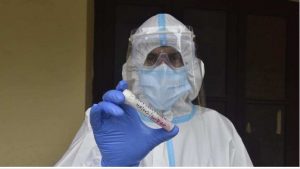India recorded more than 50,000 new cases of the coronavirus disease (Covid-19) in the last 24 hours, for the second day in a row, pushing its infection tally to more than 1.63 million, according to the Union health ministry data.
According to health ministry data, India has added 1,053,377 cases since July 1—702,689 have been just in a fortnight. It is the third worst-hit country in the world after the United States and Brazil.
With 779 fatalities between Thursday and Friday morning, the country’s death toll is now 35,747. The toll at the beginning of the month was 17,400.
The government has said India has one of the lowest case fatality rate (CFR) at 2.21% as compared to the global average of 4%. It added that 24 states and Union territories have lower CFR than the national average and eight of them have a CFR below 1%.
With 37,223 patients discharged in the last 24 hours, the number of recovered people have jumped to 1,057,805. The recovery rate is up from 64.44% on Thursday to 64.54% on Friday.
India on Thursday achieved the landmark of more than a million recoveries from Covid-19. There has been a consistent trend of more than 30,000 recoveries daily for the eighth day in a row now.
There has been a continued increase in the average daily recoveries from around 15,000 in July’s first week to around 35,000 in the last week.
The gap between recovered patients and active Covid-19 cases currently stands at more than 5 lakh now.

The government has also said that 16 states and Union territories are recording higher recovery rate than the national average. It has also said that 16 states and Union territories are recording higher recovery rate than the national average.
A senior official of the health ministry said on Thursday that the herd immunity level is “far away” for the Indian population and it can only be achieved through immunisation by vaccines.
“For a large country like India, herd immunity cannot be a strategic choice or a strategic option… It will come at too high a cost and can be done only through immunisations via vaccination,” Rajesh Bhushan, the officer on special duty, said during a briefing.
The march of an infectious disease such as Covid-19 can be halted only when there is a large enough proportion of the population that is immune to it – a threshold known as herd immunity. Besides a vaccine, which is yet to be approved, the only way people become immune is if they have had the disease and recovered.
The official also hinted that India is looking at a multilateral, World Health Organization (WHO)-led mechanism to secure Covid-19 vaccines and the country is yet to begin direct discussions with any of the developers that are leading the development race.
Bhushan also said the question on who would get the vaccine first was still under deliberation at the health ministry.
There are at least 25 vaccines in human trial phases, including two from India, across the world. Three vaccine candidates—one each from the US, UK and China—are largely regarded as the frontrunners since they are now at advanced stages of experiments among people.
In India, Bharat Biotech’s Covaxin and Zydus Cadila’s ZyCov-D are both in Phase I/II human trials for determining its safety and dosage.